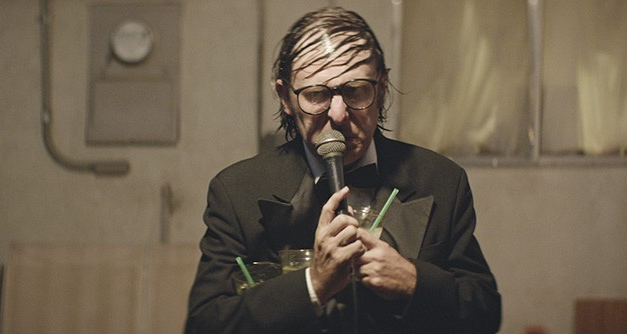If you thought it was depressing to walk through Times Square and have a faceless comic thrust a flier in your face while urgently asking, “You guys like comedy?,” think again. Because there’s no grimmer portrait of the thankless life of a comic than Rick Alverson’s Entertainment. Based on Gregg Turkington’s (in the starring role of The Comedian) alter ego, Neil Hamburger, the narrative of Entertainment follows the ragtag tour of a comedian through the lesser loved parts of California as he showcases his awkward, often uncomfortably unfunny act to some of the state’s least known dives.
With a half-assed clown named Eddie (Tye Sheridan) as his opener, the overall effect of The Comedian’s display is one of horror, and requires at least a two-drink minimum. While touring through places such as Kern County, The Comedian seeks out odd sights like airplane graveyards and aura seminars (or something resembling an aura seminar) in his spare time offstage. He even subjects himself to the judgmental hospitality of his cousin, John (John C. Reilly), a “businessman” who seems to have a lot of ideas about how The Comedian can improve his act.
All the while, The Comedian makes phone calls to a nonexistent presence he claims is his daughter–and yet, it comes across the way Agent Cooper talking to “Diane” in Twin Peaks does. Indeed, Alverson’s script possesses an all too Lynchian vibe, particularly with its desert setting and The Comedian’s surreal transpositions into a telenovela he enjoys watching while in hotel rooms. But where Lynch favors subtlety, Alverson takes it to the next level in hitting one over the head with the macabre and unwieldy, like when The Comedian happens upon a woman giving birth in a public bathroom and then delivers what turns out to be her stillborn baby or, in another strange public bathroom scenario, is pursued meekly by a hustler played, appropriately, by Michael Cera.
It is moments like these, painful and anything but humorous in nature, that perhaps lead The Comedian to snap during his act. At one point, he just makes fart noises for the duration, prompting the woman who hired him to balk, “We’re not paying you for that.” The relationship The Comedian has with each of his audiences is one of hostility, at first initiated on his part by provoking them with his crudeness, and then concluded by them with their disgusted and/or disinterested reaction.
By the end of the film, The Comedian reaches a point of breakdown, falling to his knees at a private birthday party for a spoiled rich kid somewhere in the Hollywood Hills (whom he tells his “daughter” is a “very important celebrity”). Just as in any depressive comic’s life, there is no real resolution to be had–simply the sheer force of weak will to carry on and spread the nonexistent laughter.





















